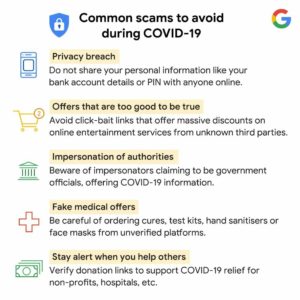Since the number of online scams regarding COVID-19 is increasing day by day, this site tries to warn the users about any online risks and scams like phishing emails as messages from charities and NGOs battling the COVID-19, or any directions from administrators to employees who are working from home, and it also notices spoofing healthcare providers. This website is presently available in Hindi and English only, and the content will soon be available in other regional languages too.
Google’s new website warns you regarding a scam and helps you spot it
The site will also inform the users to double-check the links and email addresses before clicking on them. Fake links often look like the established websites by adding extra words or letters to the URLs—one way to know is by hovering over the URL or by long press on mobile phones we can identify if its a suspicious link or not. And also, Google systems have spotted malware-laden sites that imitate the sign-in pages for of various social media accounts, health organizations, and even official coronavirus maps to get hold of the details of the user. It has been observed on Google’s advanced machine-learning classifiers that there were globally 18 million daily malware and phishing attempts related to COVID-19, in addition to that more than 240 million COVID-related spam messages in the span of few weeks. Google said that it’s built advanced security protections into Google products to spot and stop threats automatically before they even reach the users. Google machine learning models in Gmail already detect and block almost 99.9 percent of spam, phishing, and malware. The security that is built into the Chrome browser protects users by alerting them in case of any fraudulent websites. Moreover, Google Play Protect scans many apps in Google Play to safeguard users against any such risks. Other social media platforms have also stepped up their efforts in fighting against the fake news on COVID-19. According to a Facebook spokesperson, the platform has taken down almost 40 million posts which were related to COVID-19 globally, in the last month. Facebook used 4000 articles that were based on independent fact-checking partners that included NewsMobile. Facebook puts warning labels on posts that have been busted by fact-checkers. Likewise, Twitter has also removed 2230 harmful tweets in the period between March 18 and April 23. Read More:
Google Pixel 4a Expected to be Launched on May 22Patent Shows a New Foldable Smartphone by Huawei with Zoom LensOnePlus’ Budget Oriented OnePlus Z is Arriving Soon
Via 1, 2


title: “Google Launches Website To Help Users Avoid Covid 19 Online Scams” ShowToc: true date: “2023-04-16” author: “Phillip Harwood”
Since the number of online scams regarding COVID-19 is increasing day by day, this site tries to warn the users about any online risks and scams like phishing emails as messages from charities and NGOs battling the COVID-19, or any directions from administrators to employees who are working from home, and it also notices spoofing healthcare providers. This website is presently available in Hindi and English only, and the content will soon be available in other regional languages too.
Google’s new website warns you regarding a scam and helps you spot it
The site will also inform the users to double-check the links and email addresses before clicking on them. Fake links often look like the established websites by adding extra words or letters to the URLs—one way to know is by hovering over the URL or by long press on mobile phones we can identify if its a suspicious link or not. And also, Google systems have spotted malware-laden sites that imitate the sign-in pages for of various social media accounts, health organizations, and even official coronavirus maps to get hold of the details of the user. It has been observed on Google’s advanced machine-learning classifiers that there were globally 18 million daily malware and phishing attempts related to COVID-19, in addition to that more than 240 million COVID-related spam messages in the span of few weeks. Google said that it’s built advanced security protections into Google products to spot and stop threats automatically before they even reach the users. Google machine learning models in Gmail already detect and block almost 99.9 percent of spam, phishing, and malware. The security that is built into the Chrome browser protects users by alerting them in case of any fraudulent websites. Moreover, Google Play Protect scans many apps in Google Play to safeguard users against any such risks. Other social media platforms have also stepped up their efforts in fighting against the fake news on COVID-19. According to a Facebook spokesperson, the platform has taken down almost 40 million posts which were related to COVID-19 globally, in the last month. Facebook used 4000 articles that were based on independent fact-checking partners that included NewsMobile. Facebook puts warning labels on posts that have been busted by fact-checkers. Likewise, Twitter has also removed 2230 harmful tweets in the period between March 18 and April 23. Read More:
Google Pixel 4a Expected to be Launched on May 22Patent Shows a New Foldable Smartphone by Huawei with Zoom LensOnePlus’ Budget Oriented OnePlus Z is Arriving Soon
Via 1, 2

